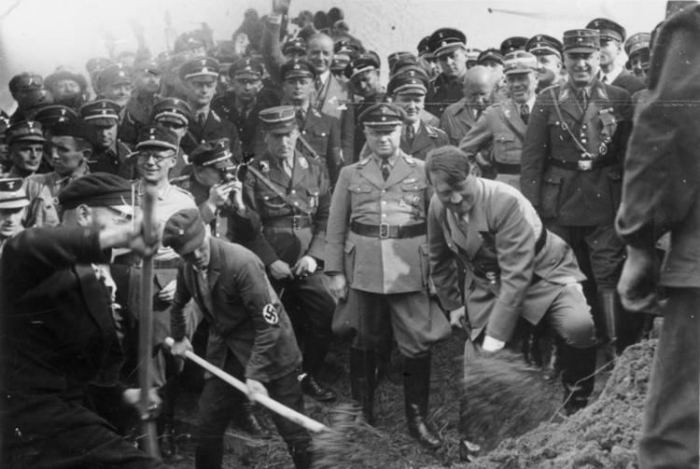The fascist corporatist economy ap world – The fascist corporatist economy, a system that emerged in the 20th century, represents a unique blend of state control and private enterprise. This introductory paragraph delves into the historical context and key characteristics of fascist corporatist economies, setting the stage for a comprehensive exploration of their advantages, disadvantages, and contemporary relevance.
Definition of Fascist Corporatist Economy

Fascist corporatist economies are a type of economic system that combines elements of capitalism and socialism. They are characterized by a strong emphasis on the role of the state in regulating the economy and a close relationship between businesses and the government.
Corporatism is the belief that society is made up of different groups or corporations that represent the interests of different sectors of the economy. In a fascist corporatist economy, these corporations are organized into a hierarchical structure, with the state at the top.
The state plays a central role in fascist corporatist economies. It sets economic policy, regulates businesses, and resolves disputes between different groups.
Fascist corporatist economies have been implemented in a number of countries, including Italy under Benito Mussolini and Germany under Adolf Hitler.
Characteristics of Fascist Corporatist Economies: The Fascist Corporatist Economy Ap World

Fascist corporatist economies have a number of key characteristics:
- The state plays a central role in the economy.The state sets economic policy, regulates businesses, and resolves disputes between different groups.
- Businesses are organized into corporations that represent the interests of different sectors of the economy.These corporations are organized into a hierarchical structure, with the state at the top.
- Labor unions and other interest groups are suppressed.The state controls all aspects of the economy, and there is no room for independent organizations to represent the interests of workers or other groups.
- The economy is highly regulated.The state sets prices, wages, and other economic variables.
- There is a strong emphasis on economic stability and growth.The state uses its power to promote economic growth and prevent economic downturns.
Advantages and Disadvantages of Fascist Corporatist Economies

Fascist corporatist economies have a number of potential advantages and disadvantages.
Advantages, The fascist corporatist economy ap world
- Economic stability.The state’s control over the economy can help to prevent economic downturns.
- Increased productivity.The state can use its power to promote economic growth and increase productivity.
Disadvantages
- Suppression of individual rights.The state’s control over the economy can lead to the suppression of individual rights and freedoms.
- Economic inequality.The state’s control over the economy can lead to economic inequality, with some groups benefiting more than others.
- Lack of innovation.The state’s control over the economy can stifle innovation and creativity.
Historical Examples of Fascist Corporatist Economies
Fascist corporatist economies have been implemented in a number of countries, including Italy under Benito Mussolini and Germany under Adolf Hitler.
Italy under Mussolini
Mussolini’s fascist government implemented a corporatist economic system in the 1920s and 1930s. The state played a central role in the economy, and businesses were organized into corporations that represented the interests of different sectors of the economy.
Mussolini’s economic policies were successful in promoting economic growth and stability. However, they also led to the suppression of individual rights and freedoms.
Germany under Hitler
Hitler’s Nazi government implemented a corporatist economic system in the 1930s and 1940s. The state played a central role in the economy, and businesses were organized into corporations that represented the interests of different sectors of the economy.
Hitler’s economic policies were successful in promoting economic growth and stability. However, they also led to the suppression of individual rights and freedoms and the outbreak of World War II.
Contemporary Relevance of Fascist Corporatist Economies
Fascist corporatist economic ideas have had a significant impact on the development of economic policies in the modern world.
Some contemporary economic policies, such as industrial policy and government subsidies, resemble fascist corporatist principles. These policies are often justified on the grounds that they promote economic growth and stability.
However, it is important to be aware of the potential dangers of fascist corporatist economic ideas. These ideas can lead to the suppression of individual rights and freedoms, economic inequality, and a lack of innovation.
FAQ
What is the primary goal of a fascist corporatist economy?
To achieve economic stability, increased productivity, and national self-sufficiency through state-controlled coordination of industry and labor.
How does the state exert control in a fascist corporatist economy?
Through the establishment of industry-specific syndicates that represent both employers and workers, with the state acting as the ultimate arbiter.
What are some examples of countries that have implemented fascist corporatist economies?
Italy under Benito Mussolini, Germany under Adolf Hitler, and Spain under Francisco Franco.